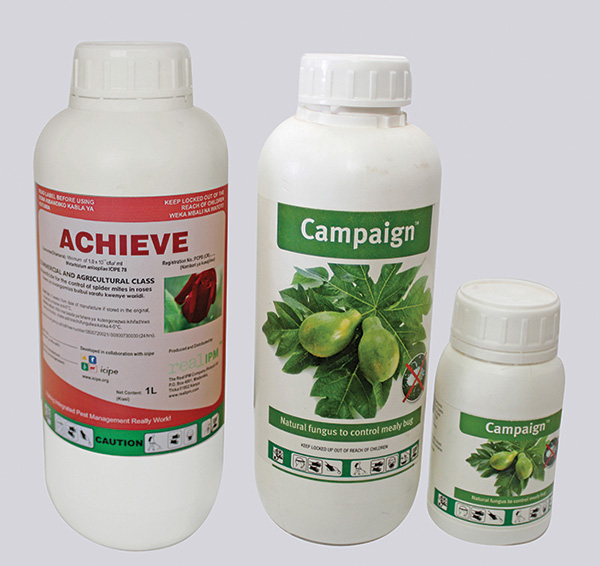icipe Biopesticides
Globally, the replacement of synthetic pesticides with biological alternatives is seen as an ideal strategy towards sustainable agriculture and the conservation of biological biodiversity.
In accordance, icipe has been bioprospecting novel arthropod pathogens, especially entomopathogenic fungi, for their efficacy against insect pests and disease vectors.
Entomopathogenic fungi, which include taxa from several of the main fungal groups, act as parasites, causing infections in insects either killing or seriously disabling them. Entomopathogens are known to specifically attack pests and vectors, and because they do not produce toxic residues, they are also environmentally safe.
icipe’s research has led to the formulation of several biopesticides using isolates from Metarhizium anisopliae, an entomopathogenic fungi that occurs naturally in the soil. These products have been found to be compatible with other components of icipe’s integrated pest management (IPM) strategies. Through a partnership with Real IPM Ltd, a Kenya-based private sector company, two icipe biopesticides are being commercialised as Campaign® (ICIPE69) and Achieve™ (ICIPE78).
 Campaign® has been registered in Ethiopia, Kenya, Ghana, South Africa and Tanzania, where it is being used against mealybugs, thrips and fruit flies, in crops such as cucumber, mango, papaya, roses and tomatoes, among others. In particular, Campaign® is receiving growing attention across Africa for its efficacy as a drench treatment to kill soil-dwelling stages of fruit flies. Based on its effectiveness and increasing demand by mango growers, the Centre is exploring methods to enhance the use of Campaign®. For instance, the researchers are assessing the possibility of using the biopesticide in an auto-dissemination strategy. In this case, adult fruit flies would be attracted to the biopesticide using visual, chemical or food lures. The pests would then pick up the fungal spores becoming infected themselves, and before their own death, they would transmit the contamination to others, through mating, physical contact and lek formation (gathering together to attract females) by male flies. In field trials, a combination of Campaign® and DuduLure, a locally developed bait, resulted in the suppression of 94.3% of fruit flies in mango orchards. In fields treated with the biopesticide, fruit infestation was 7.2%, compared to 54.9% in untreated orchards. These outcomes present one of the strongest possibilities for the complete elimination of chemical pesticide in fruit fly control in Africa.
Campaign® has been registered in Ethiopia, Kenya, Ghana, South Africa and Tanzania, where it is being used against mealybugs, thrips and fruit flies, in crops such as cucumber, mango, papaya, roses and tomatoes, among others. In particular, Campaign® is receiving growing attention across Africa for its efficacy as a drench treatment to kill soil-dwelling stages of fruit flies. Based on its effectiveness and increasing demand by mango growers, the Centre is exploring methods to enhance the use of Campaign®. For instance, the researchers are assessing the possibility of using the biopesticide in an auto-dissemination strategy. In this case, adult fruit flies would be attracted to the biopesticide using visual, chemical or food lures. The pests would then pick up the fungal spores becoming infected themselves, and before their own death, they would transmit the contamination to others, through mating, physical contact and lek formation (gathering together to attract females) by male flies. In field trials, a combination of Campaign® and DuduLure, a locally developed bait, resulted in the suppression of 94.3% of fruit flies in mango orchards. In fields treated with the biopesticide, fruit infestation was 7.2%, compared to 54.9% in untreated orchards. These outcomes present one of the strongest possibilities for the complete elimination of chemical pesticide in fruit fly control in Africa.
Achieve™ has been found to be effective against spider mites, and to control them without killing predatory mites There is also potential of using Achieve™ to control varroa mites, parasites of bees, without harming the bees. Its registration is in progress in Ghana and South Africa.
Real IPM has plans to increase the global reach of Campaign® and Achieve™, with negotiations underway for their commercialisation in Europe, North America and Asia. In the meantime, icipe has made significant progress in developing new biopesticides, which are expected to be ready for dissemination in the coming months.

